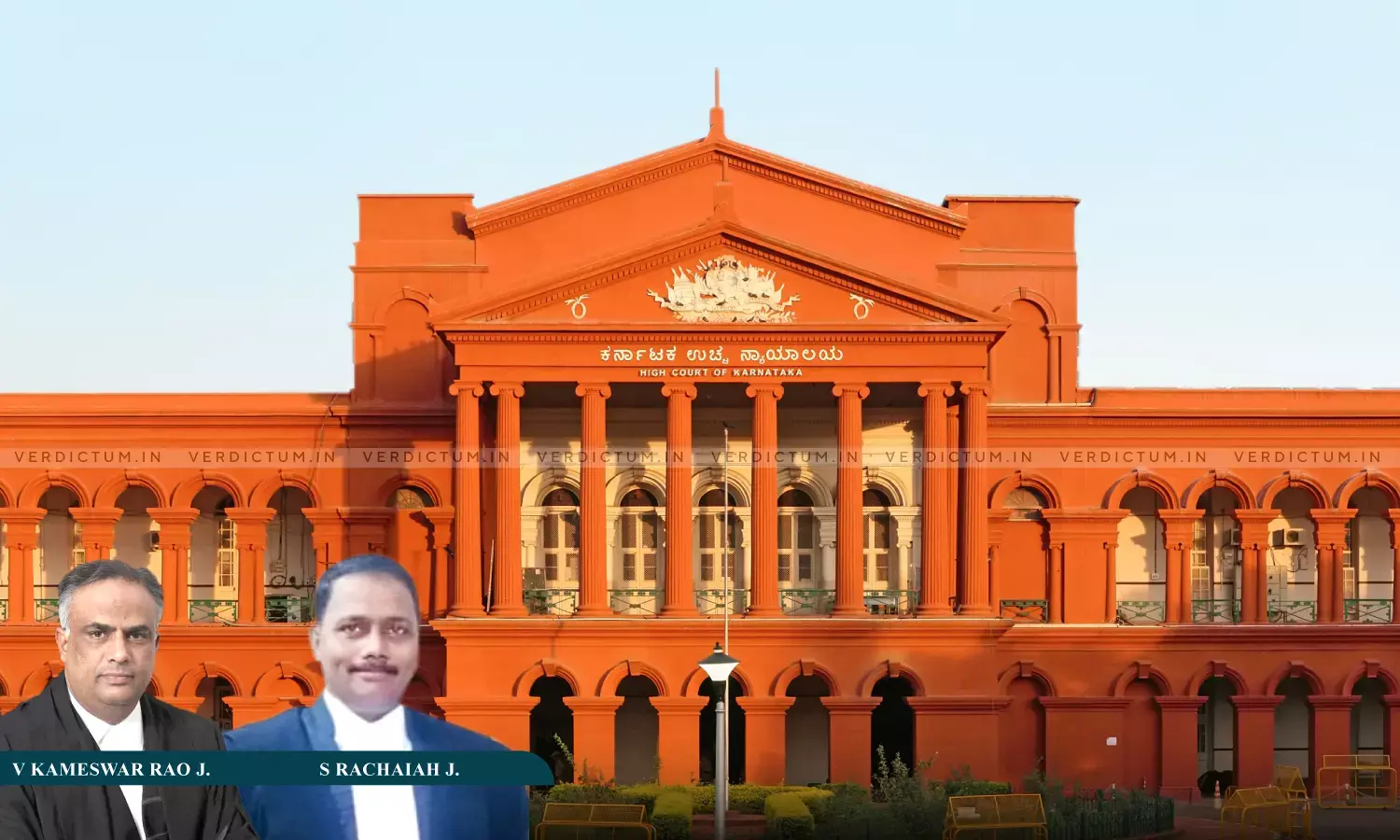PMLA| ED Can Summon Individuals Even If Not Accused, If Predicate Offence Is Pending: Karnataka High Court
The case pertains to Gowda, a 62-year-old former chairman of Shivamogga District Cooperative Central (DCC) Bank, who served in the position from 1997 to 2020.

The Karnataka High Court has held that the Enforcement Directorate (ED) has the authority to summon individuals under the Prevention of Money Laundering Act (PMLA) even if they are not formally accused, as long as the predicate offence is pending before the jurisdictional court.
The Court emphasized that such summons are valid for recording evidence or producing documents during an investigation.
The Division Bench of Justice V. Kameswar Rao and Justice Siddaiah Rachaiah emphasized, "Section 50(2) uses the expression "any person" and as such, it is immaterial whether the appellant is an accused or not as long as the predicate offence is pending in jurisdictional Court for which summoning has been done for recording evidence or production of documents during the course of investigation or proceedings under the Act."
The Court dismissed a Writ Appeal filed by former bank chairman R.M. Manjunath Gowda, challenging the ED’s summons in a money laundering investigation.
The case pertains to Gowda, a 62-year-old former chairman of Shivamogga District Cooperative Central (DCC) Bank, who served in the position from 1997 to 2020. The ED summoned him in connection with an alleged fraudulent gold loan scheme and misappropriation of approximately Rs. 63 crore.
Facts of the Case
The case against Gowda dates back to 2014, when an FIR was registered at Doddapete Police Station, leading to a charge sheet under Sections 409, 120B, and 201 of the Indian Penal Code (IPC). Initially, he was not named as an accused. However, following further investigation under Section 173(8) of the Code of Criminal Procedure (CrPC), a supplementary charge sheet filed in 2021 included him under Sections 409 and 202 of the IPC.
Additionally, a separate case under the Prevention of Corruption Act, 1988, was registered against him in May 2014, culminating in a charge sheet filed in March 2018.
Arguments Before the Bench
Gowda challenged the ED’s summons, arguing that none of the offences he was charged with fell under the scheduled offences listed in the PMLA. He contended that his name was dropped from the original 2014 case, and the subsequent charge sheet in 2021 introduced charges that were not part of the PMLA’s schedule. Furthermore, he maintained that Section 13(1)(e) of the Prevention of Corruption Act, which deals with disproportionate assets, is not a scheduled offence under PMLA unless linked to allegations under Sections 13(1)(a) to (d).
His counsel, Senior Advocate Jayakumar S. Patil, cited the Supreme Court's ruling in Vijay Madanlal Choudhary and Others vs. Union of India and Others (2022), arguing that the ED cannot initiate proceedings against any person on a notional basis or mere assumption of a scheduled offence unless it has been formally registered by the jurisdictional police.
On the other hand, Additional Solicitor General of India (ASGI) Aravind Kamath, appearing for the ED, countered that the existence of a predicate offence is sufficient to trigger an Enforcement Case Information Report (ECIR) and commence investigation under PMLA.
Citing Pavana Dibbur vs. Directorate of Enforcement (2023), he argued that investigations under PMLA can extend to individuals who are not formally accused of a predicate offence.He emphasized that the ED’s power under Section 50(2) allows it to summon "any person" deemed necessary for providing evidence.
Court’s Observations
The High Court ruled that the ED is well within its rights to summon Gowda under Section 50 of the PMLA. The division bench emphasized that the phrase "any person" in the provision allows the ED to summon individuals regardless of whether they are formally accused of a crime. The court clarified:
Referring to the police charge sheet in FIR No. 325/2014, which included offences under Sections 471 and 120B of the IPC both scheduled offences under PMLA; the court noted that Gowda was initially named as Accused No. 15. While his name was later dropped, the subsequent charge sheet reinstated him under Sections 409 and 202 read with Section 36 of the IPC. Given that the predicate offence remained pending, the court found no merit in his challenge to the summons.
The Court further observed that summoning a person does not imply guilt but is merely part of the evidence-gathering process. It pointed out that Gowda, as chairman of the bank, had significant access to internal processes related to loan approvals and verification. This made his testimony crucial in tracing the money trail of the alleged fraud.
Summons Does Not Violate Constitutional Rights
Addressing concerns raised under Article 20(3) of the Constitution, which protects individuals from self-incrimination, the court clarified that the ED’s summons does not compel a person to testify against themselves in a criminal trial. Instead, it is an investigative tool aimed at collecting evidence at the preliminary stages.
The Division Bench also referred to the Madras High Court’s ruling in K. Govindaraj vs. Union of India and Others (2024), which cited a Supreme Court interim order holding that persons summoned under Section 50(2) of PMLA are obliged to comply with such summons.
Conclusively, the Court held, "We hold that the present appeal filed by the appellant is totally misconceived; the learned Single Judge is justified in rejecting the writ petition. We also, dismiss the appeal; the impugned order dated 20.02.2024 passed by the learned Single Judge in WP No.22780/2023 is upheld."
Cause Title: Sri R M Manjunath Gowda v. Directorate Of Enforcement And Another [WA No.497 of 2024]
Appearance:-
Appellant: Senior Advocate Jayakumar S. Patil, Advocate Varun Jayakumar Patil
Respondent: ASG Aravind Kamath, Advocate Madhukar M. Deshpande
Click here to read/download the Judgment

